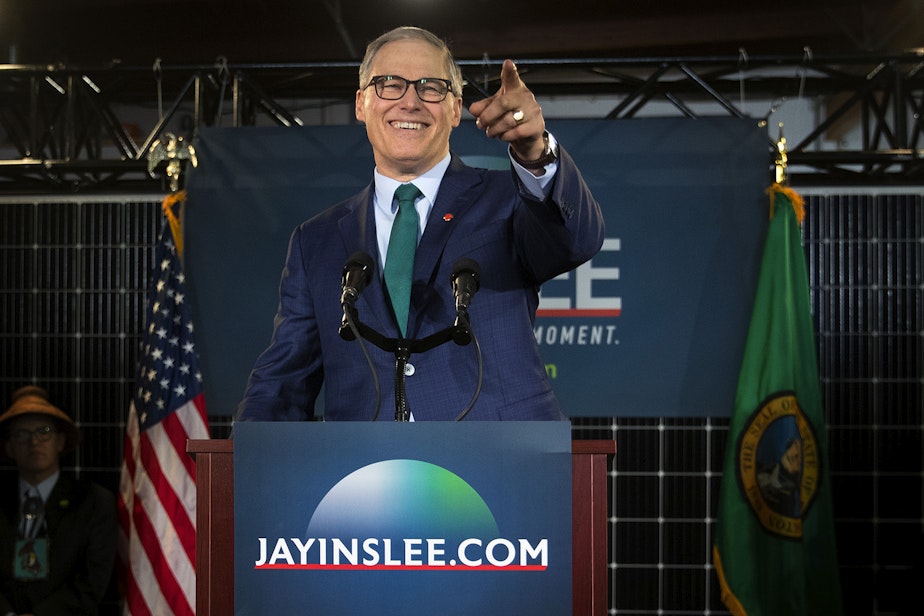If a bargain gets vetoed, was it ever really 'grand'? This week in politics

Washington Governor Jay Inslee is in hot water — with Republican lawmakers, yes, but also some fellow Democrats.
It’s about a so-called “grand bargain” agreed to during the recent legislative session in the state Senate. That deal smoothed the way for the passage of two landmark climate bills: a carbon-cap program and clean fuel standards.
These were bills Inslee wanted, and he did sign them. But there was a significant caveat that has lawmakers crying constitutional foul.
Inslee vetoed parts of the bills that linked them to a new statewide transportation funding package. The deal required approval of that transportation package before the climate laws take effect. The transportation package never happened, though; many lawmakers think it will be a topic for debate in a special session later this year.
The vetoes may not be legal, setting off fireworks from legislators who say Inslee exceeded his authority.
KUOW statehouse correspondent Austin Jenkins says Inslee effectively blew up the deal that allowed these climate bills to cross the finish line and make it to his desk in the first place.
But the more pressing issue is a legal one.
"The state Constitution says that the governor can veto entire bills, entire sections of bills and appropriation items, but he can’t veto subsections or individual lines in bills..." Jenkins said. "He doesn’t have general line-item veto power. Yet that's exactly what Inslee did."
Senate Majority Leader Andy Billig, a Democrat like Inslee, said this will make it harder in the future to craft good-faith deals in the Legislature; Inslee had not indicated he may nix the deal before it was done.
And Jenkins says legislative leaders "came unglued."

"[Democratic] Speaker of the House Laurie Jinkins essentially said 'we’ll see you in court,'" Jenkins said.
Billig added, "The Legislature will use every power at its disposal to push back and preserve the balance of power between the executive and legislative branches."
Inslee has defended the move, arguing this wasn't his grand bargain — he didn't agree to it — and that he’s within his right to veto this particular subsection because the Legislature intentionally tried circumvent his veto authority. In other words, Jenkins explains, he says they planted the language about a transportation package into a section that is unrelated.
In his veto message, Inslee said, “This type of legislative drafting demonstrates manipulation and is a palpable attempt at dissimulation,” which essentially means a form of concealment.
Still, Joni Balter, host Seattle CityClub’s Civic Cocktail on the Seattle Channel, says "It’s about the most third-term thing a governor could do."
Sponsored
And it comes at a time when Inslee is already in trouble with constituents: he's also facing a recall effort now.
That campaign is not related to these controversial vetoes, but it is alleging Inslee went beyond his executive authority. In this case, he's accused of going too far to mitigate the coronavirus pandemic.
Petitioners will have to first get a judge to find that the charges meet the test for malfeasance of misfeasance in public office or violations of oath of office. To some degree, the question of the governor's authority during the pandemic has been asked and answered; no court has found evidence that he's overstepped thus far.
Balter doesn't foresee anything difference in the case brought by the recall campaign.
"The recalls here and elsewhere are a second-cousin of the idea that we shouldn’t accept election results even when we know that, in the case of the governor, he won by a solid amount just six months ago," she says. "This is Trump-think, Loren Culp-think: Keep re-litigating the same election, never concede and maybe people will think you somehow are in your position illegitimately."
Sponsored
Balter and Jenkins joined KUOW's Angela King to talk about the week in politics. Listen to the conversation by clicking the audio above.






